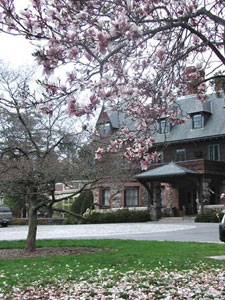You have /5 articles left.
Sign up for a free account or log in.

Pine Manor College
Pine Manor College -- which has been struggling to maintain enrollments -- announced Wednesday that it will admit male students to all programs. While men have already been admitted to a number of programs, the residential bachelor's program has until now been for women only.
The decision by Pine Manor, in Massachusetts, comes six months after Wilson College, in Pennsylvania, announced a similar move. Indeed a report prepared for the Pine Manor board cited analysis done on the issue at Wilson. The most competitive women's colleges (the former Seven Sisters institutions that remained single-sex and a number of others, generally institutions with meaningful endowments), continue to do well in recruiting students, and show no interest in admitting men.
But among less competitive colleges, the pace of change appears to be increasing. Last year, when Georgian Court University announced plans to admit men, officials there noted that about 10 women's colleges in the previous 10 years had done so, leaving the total number of women's colleges at around 50. Now, a year later, two more have joined the trend.
A report prepared by a Pine Manor committee that studied the issue noted the reasons cited by other colleges, such as the very small percentage of female high school seniors who seek out or will even consider attending women's colleges. But there was particular urgency at Pine Manor because of its accreditation woes. The New England Association of Schools and Colleges placed Pine Manor on probation for two years, starting in late 2011, citing serious concerns about the institution's finances. Those concerns are, in turn, related to enrollment.
Current enrollment is about 300 at an institution with space in its dormitories for 600, and space in its classrooms for many more. The college committee that studied coeducation noted in its report that NEASC officials had been "completely clear that enrollment is going to be an important factor in their reaccreditation decision-making process." The report also quoted "a recent communication from NEASC that said that 'the college has not considered the current cultural and demographic trends which demonstrate a significantly diminished market of high school graduates who seek to enroll in single-sex institutions.'"
While that logic swayed the college's board, some alumnae took to Facebook to voice their disagreement. Notably, however, many of those who were upset also indicated that they realized that the college needs more students.
Wrote one alumna: "It will never be the same place. Now my diploma is a collector's item. I understand the need for students in order to survive as a college but now it is no longer the place I want to send my daughter to college."
Joseph Lee, interim president at Pine Manor, said in an interview Wednesday that he believed the college was on track to get renewed approval from its accreditor. He also said that the college has already met with many alumnae, who understand the difficulty of operating a small college without much money. "We did a lot of outreach so the short-term feedback I've received is all positive," he said. "But some of the social media is not positive."
Elizabeth Kiss, president of Agnes Scott College and chair of the board of the Women's College Coalition, said that she felt "sadness" at the decision of a women's college to seek a different model, but that women's colleges have different circumstances and different resources, and that she could never judge such a decision.
Many women's colleges are "seeing historically high record enrollment," Kiss said. Agnes Scott, for instance, is projecting to have its second-largest entering class ever this fall, and three years ago had the largest-ever class.
At the same time, she noted that other women's colleges "are struggling," but she said that the same could be said for a number of coeducational small private colleges without large endowments. Just this week, Point University and Montreat College announced plans to merge.
Colleges facing tight finances -- whether single-sex or not -- "are having to rethinking their core missions," Kiss said. And in times as challenging as this period is, that means that coeducation "is on the table" at some single-sex institutions.








